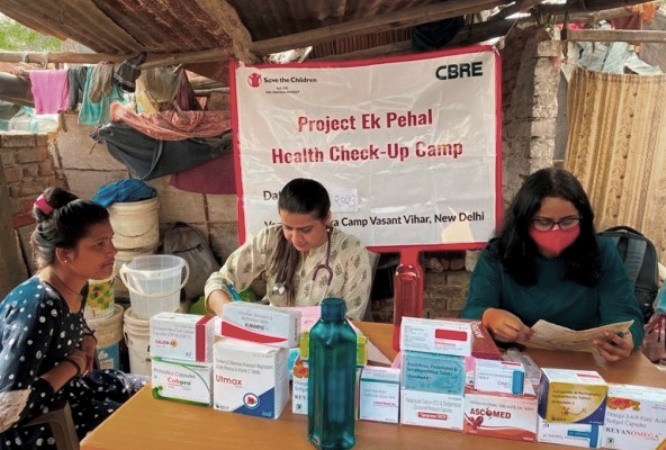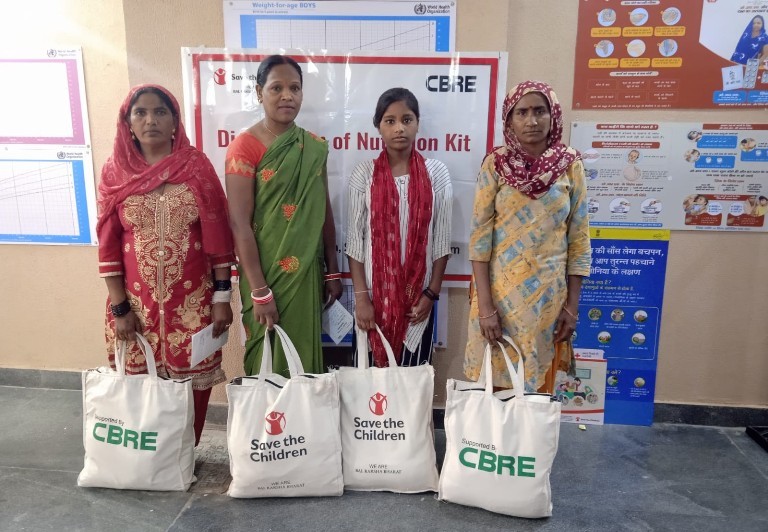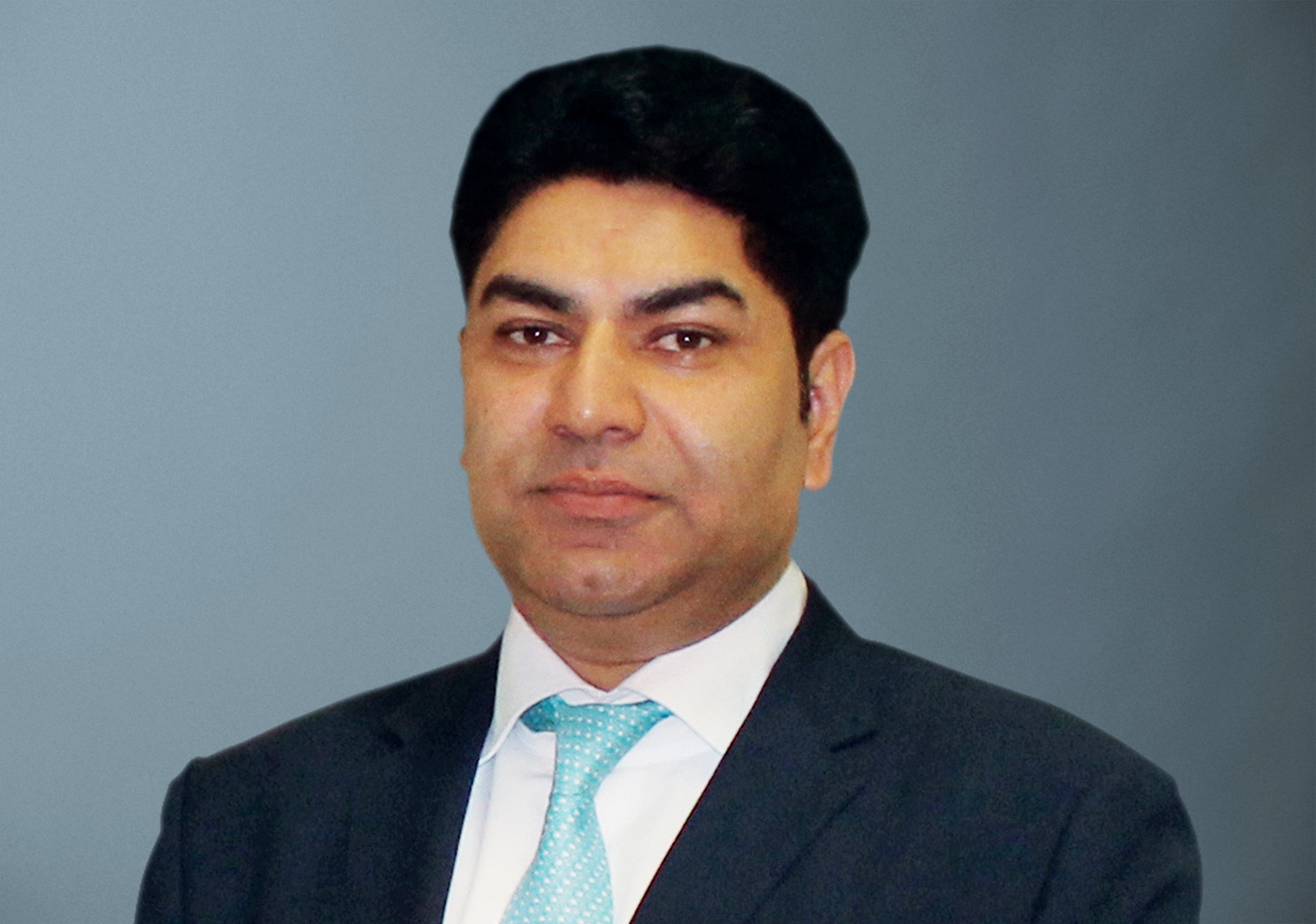CBRE, a Fortune 500 and S&P 500 company headquartered in Dallas, holds the distinction of being the world's largest commercial real estate services and investment firm. The company entered the Indian market in 1994, becoming the first International Property Consultancy to establish a presence in the country. Over the years, its operations have flourished, boasting a workforce of more than 10,000 professionals across 15 offices and a presence in over 80 cities. With approximately 115,000 dedicated employees across more than 100 countries, CBRE is also known for its sustainable and socially responsible approach to business.
In this exclusive interview, we have the opportunity to gain insights into CBRE India's remarkable Corporate Social Responsibility (CSR) and sustainability initiatives. We delve into the heart of their pan-India CSR initiative, CBRE Cares- 'Ek Pehal,' which has been launched in partnership with Bal Raksha Bharat. This visionary initiative is aimed at transforming the lives of migrant laborers and their families in India through access to critical services in healthcare, education, and nutrition.
In this interview with TheCSRUniverse, Mr. Anshuman Magazine, Chairman & CEO - India, South-East Asia, Middle East & Africa, CBRE, sheds light on the motivations behind CBRE's CSR endeavors, the partnership with Bal Raksha Bharat, the ESG performance within their own operations, and their roadmap for future with respect to social impact and sustainability.
Scroll down to gain a deeper perspective on sustainability in the Indian real estate sector as well as the insights on CBRE’s extensive social endeavors in the country:
Q. Please provide an overview of CBRE Cares- 'Ek Pehal', the pan-India CSR initiative launched by CBRE in partnership with Bal Raksha Bharat. What drove CBRE to focus its CSR efforts specifically on migrant laborers and their families in India and how has the progress been so far?

A. CBRE's corporate social responsibility (CSR) initiative, CBRE Cares- 'Ek Pehal,' is dedicated to enhancing the well-being of migrant laborers and their families. With a focus on providing access to essential services, CBRE Cares- 'Ek Pehal' aims to improve the lives of migrant laborers by addressing critical areas such as healthcare, education, and nutrition.Through a strategic partnership with Bal Raksha Bharat and the support of the government, CBRE plans to support approximately 300,000 laborers in major cities like Delhi-NCR, Bangalore, Hyderabad and Pune.
One of the key objectives of the program is to alleviate the hardships faced by migrant workers, including poverty, illness, and despair. By offering quality healthcare services, formal education opportunities, and improved nutrition standards, CBRE aims to create a positive and lasting impact on their lives.
To maximize the effectiveness of CBRE Cares- 'Ek Pehal,' CBRE collaborates closely with implementation partners and integrates with existing initiatives. By leveraging the collective expertise and resources, CBRE strives to raise awareness among families and communities about good health practices while expanding the reach and impact of these programs. Through its comprehensive approach to corporate social responsibility, CBRE is dedicated to making a meaningful difference in the lives of migrant laborers, empowering them to lead healthier and more fulfilling lives.
Q. The partnership with Bal Raksha Bharat is a crucial aspect of the ‘Ek Pehal’ initiative. How does Bal Raksha Bharat support CBRE in achieving its CSR objectives, especially in terms of addressing urban malnutrition and learning gaps? Also, what type of government support is involved in this initiative?
 A. Nutrition is a multi-sectoral problem; thus, the solution has to be multi-sectoral in nature. Building on this concept, CBRE, with the support of Bal Raksha Bharat, will prioritize urban malnutrition in children and women across intervention locations. The delivery of existing interventions focuses on growth monitoring but not on supplementing with a high-value nutritious diet and intensified efforts towards behaviour change, as a result, it causes the problem of under-nutrition and anaemia, therefore, strengthening existing programme implementation along with noble ideas is the need of the hour. Adequate nutritional support, regular growth monitoring sessions, and mobilizing the community by involving men and women would help to get better outcomes, particularly at a community level.
A. Nutrition is a multi-sectoral problem; thus, the solution has to be multi-sectoral in nature. Building on this concept, CBRE, with the support of Bal Raksha Bharat, will prioritize urban malnutrition in children and women across intervention locations. The delivery of existing interventions focuses on growth monitoring but not on supplementing with a high-value nutritious diet and intensified efforts towards behaviour change, as a result, it causes the problem of under-nutrition and anaemia, therefore, strengthening existing programme implementation along with noble ideas is the need of the hour. Adequate nutritional support, regular growth monitoring sessions, and mobilizing the community by involving men and women would help to get better outcomes, particularly at a community level.
Our collaborative efforts aim to address the pressing issue of bridging learning gaps. Under this project, we will set up Multi Activity Centres (MAC) to create a Child-Friendly Space (CFS) to ensurethe safety and protection of all children while their parents are out at work. We plan to conduct Catch Up Clubs (CUCs) to provide support in literacy, numeracy and SEL (Social Emotional Learning), it will provide comprehensive support for child’s well-being and ensure that most marginalized children succeed in school. These centres will provide a supportive and engaging environment, equipping children with the necessary knowledge and skills. Moreover, schools will be equipped with learner-friendly ICT-based resources, digital libraries, and tablets, enhancing the learning experiences of both students and teachers.
To achieve these goals, the initiative will leverage the expertise of Bal Raksha Bharat and CBRE while ensuring continuous linkages to government schemes like Ayushman Bharat and Pradhan Mantri Suraksha Bima Yojana. By raising awareness and facilitating access to these schemes, Ek Pehal aims to bring about positive changes in the lives of families in need.
In targeted cities, a range of interventions will be implemented to tackle the identified challenges. Health check-up camps, organized in partnership with the health department, will ensure regular monitoring and early intervention. Additionally, dedicated health camps will be established in urban slums, offering much-needed healthcare services to marginalized communities. Furthermore, the initiative will actively promote awareness about government health schemes, emphasizing menstrual hygiene, maternal and child health, and other critical areas.
As part of its commitment to holistic well-being, Ek Pehal will actively contribute to the Ayushman Bharat - School Health and Wellness Program (AB-SHWP). By enhancing the capacity of teachers and students alike, the initiative seeks to foster a healthy and conducive learning environment.
Through the Ek Pehal initiative, Bal Raksha Bharat and CBRE are dedicated to driving positive social change, ensuring the well-being and future prospects of vulnerable children and their families.
Q. Could you elaborate on the specific health services and educational support that will be provided to the target community through this initiative? What is the geographical coverage and scale you are looking at in this financial year?
A. This year's CSR initiatives are set to significantly impact on learning and well-being by implementing key interventions, such as establishing smart classrooms, digital libraries, and strengthening WASH (water, sanitation, and hygiene) infrastructure. With a focused approach, these initiatives will be rolled out across targeted cities, including Delhi NCR, Bengaluru, and Pune.
To ensure the success of these interventions, proactive engagement with the health department is planned, enabling routine health check-up camps to be conducted in the identified intervention areas. Additionally, dedicated health camps will be established in urban slums, with the support and collaboration of the concerned Civil Surgeon/Chief District Medical Officer (CDMO), to prioritize the well-being of families in these communities.
Under this comprehensive initiative, 10 breast cancer screening camps are scheduled, benefiting a total of 500 women. Furthermore, 1,000 children, men, and women will have the opportunity to receive low-cost, high-quality spectacles, improving their vision and overall quality of life. To enhance the capacity of the health workforce, 60 health frontline workers will undergo training in primary health care, with a specific focus on maternal, new-born, child, and adolescent healthcare and nutrition services.
To ensure maximum reach and impact, the project staff, along with frontline workers such as ASHAs (Accredited Social Health Activists) and AWWs (Anganwadi Workers), will mobilize and raise awareness among the population residing in catchment areas. Visitors to the health camps will be actively encouraged to avail themselves of various government health schemes, including Ayushman Bharat, Pradhan Mantri Suraksha Bima Yojana, and ABHA Card.
The project will identify and target malnourished children and children affected by tuberculosis, particularly focusing on pregnant and lactating women with a low Body Mass Index score of 18.5, in consultation with the District Tuberculosis Officer. The program will also include sensitization on menstrual hygiene, distribution of sanitary napkins to menstruating women, and awareness activities on Maternal, New-born, Child, and Adolescent Health (MNCAH) and government schemes and programs. Furthermore, the initiative will support the Ayushman Bharat - School Health and Wellness Programme (AB-SHWP) by building the capacity of teachers and students.
In the education sector, Multi Activity Centers (MAC) will be established as accelerated learning centres for out-of-school children aged 6-14 years, including those who have never been enrolled, dropped out, engaged in child labour, or living in challenging circumstances. The CSR initiative will equip schools with learner-friendly, ICT-based resources and enhance teachers' capacity to utilize digital resources to improve the learning experiences of both girls and boys. The establishment of SMART classrooms and digital libraries will provide children with access to physical and digital resources to support their education. Additionally, schools will be provided with tablets to facilitate digital resource access for students and teachers.
Q. What are the other focus areas of CBRE’s CSR initiatives in India? How do they align with the company’s broader goals and vision?
A. As a responsible brand, CBRE is dedicated to making a meaningful difference in society through its CSR initiatives in India. These initiatives are carefully designed to align with the company's broader goals and vision, extending beyond individual projects to create a lasting positive impact.
CBRE's CSR initiatives cover a range of focus areas, including Sustainability; Community Development and Empowerment; and Child Health and Education, among others. By addressing these important areas, CBRE aims to contribute to the well-being of communities and promote sustainable practices that benefit both people and the environment.
Q. Please share some details of your interventions in WASH- what kind of initiatives have you implemented (or plan to implement) and what kind of impact are you looking at creating through them?
A. As part of the WASH (water, sanitation, and hygiene) initiative, hygiene kits will be distributed to families to improve their health and hygiene levels. These kits contain items such as sanitary pads, nail cutters, soap, and combs. An awareness program will be organized in collaboration with ICDS and Health departments to provide information on WASH, and regular outreach activities will be conducted to ensure proper sanitation and hygiene practices. Community health workers will be educated on handwashing, sanitation, and safe drinking water through one-on-one outreach, and awareness sessions will be held during mothers' meetings at Anganwadis. Best practices will be documented and shared with the donor monthly, and children and women will receive personal hygiene kits to promote handwashing practices.
Menstrual hygiene management (MHM) facilities are inadequate, especially in urban slums, schools, and workplaces, which poses significant challenges for women and girls. Lack of separate toilets, proper means for disposal, and access to water for handwashing hinder the effective management of menstrual hygiene. Training sessions on MHM will be conducted for women and adolescent girls, covering topics such as reproductive organs, menstrual hygiene, child abuse, and nutrition. In Pune, training on making reusable pads will be part of MHM awareness sessions, providing self-dependence and environment-friendly livelihoods. Discussions are also underway to launch a scheme for promoting menstrual cups and sanitary pads, connecting girls and women in the intervention area with the scheme.
Q. ESG compliance and overall sustainability are rapidly becoming indicators of business performance and future viability. Being a leading real estate services and investment firm, what is your take on the current status of Indian real estate sector in this regard?
A. We recognize the growing importance of these aspects in the Indian real estate sector. Over time, we have observed a notable shift in the industry's mindset, witnessing a greater focus on sustainability practices, green buildings, and responsible development. This positive trend demonstrates a growing recognition of the importance of integrating environmental, social, and governance considerations into the sector's operations, in line with global standards and best practices.
While progress has been made, there is still work to be done. We remain resolute in our commitment to driving the adoption of ESG principles, promoting sustainable development, and fostering a more resilient and inclusive real estate sector in India. Our goal is to encourage industry-wide collaboration, knowledge sharing, and the implementation of innovative solutions that promote environmental stewardship, social well-being, and robust governance practices.
Q. What would your suggestions be to- a) real estate companies; and b) policymakers- to elevate the ESG and sustainability markers in the Indian real estate industry?
A. For real estate companies, embrace ESG (Environmental, Social, and Governance) principles and make sustainability a foundational aspect of your operations. By integrating these values into every facet of your business, you can unlock numerous benefits and create a positive impact. Here are some key suggestions: Embrace green building practices, implement energy-efficient technologies, promote waste reduction and recycling and prioritize social responsibility. By adopting a comprehensive and holistic approach to sustainability, real estate companies can enhance their brand reputation, attract socially conscious investors, and create long-term value for all stakeholders.
To policymakers, I recommend creating an enabling regulatory environment that incentivizes and rewards sustainable practices in the real estate industry. This can be achieved through the formulation of clear guidelines, tax incentives, and grants for green building certifications. Additionally, policymakers should encourage collaboration between industry stakeholders, research institutions, and government agencies to develop innovative solutions and promote knowledge sharing in sustainability practices.
By implementing these recommendations, policymakers can drive the adoption of ESG and sustainability practices in the Indian real estate industry. This collaborative approach will result in a greener, more resilient, and socially responsible built environment, benefiting current and future generations.
Q. Has CBRE undertaken any specific initiatives towards improving sustainability and ensuring better ESG performance for its own operations in India?
A. At CBRE, sustainability and ESG performance are key pillars of our operational strategy in India. We have undertaken specific initiatives to drive sustainability and enhance our ESG performance across our own operations. Our commitment to a sustainable future is evident in our ongoing efforts to reduce energy consumption, optimize water usage, minimize waste generation, and promote environmentally friendly practices.
We have implemented measures such as energy-efficient lighting systems, waste segregation programs, and water conservation practices within our office spaces. We prioritize LEED certification for our buildings, ensuring compliance with green building standards and minimizing environmental impact.
In addition, we actively promote employee engagement in sustainability initiatives through awareness campaigns, green committees, and volunteer programs that foster a culture of sustainability within our organization.
We believe that by leading by example, we can inspire and encourage the wider real estate industry to embrace sustainability and ESG practices, driving positive change and contributing to a more sustainable future for India.
Q. Looking ahead, what is CBRE's future vision with regard to social impact and sustainability initiatives in India?
A. We have a clear vision for the future of social impact and sustainability initiatives in India at CBRE. Our goal is to lead the way in driving positive change and making a meaningful difference in the communities we serve. We are dedicated to advancing sustainability practices in the real estate sector, creating a more inclusive and resilient environment that meets the needs of both current and future generations.
Our commitment involves utilizing our expertise, resources, and partnerships to develop sustainable spaces that improve quality of life, foster social well-being, and prioritize environmental responsibility. We go beyond our operations by actively collaborating with stakeholders, including clients, industry peers, and policymakers, to encourage the widespread adoption of sustainable practices throughout the industry.
Through integrating ESG considerations into our business strategies, developing innovative solutions, and promoting social responsibility, we aspire to act as a catalyst for positive change in the Indian real estate industry. Our future vision revolves around contributing to the creation of sustainable communities, empowering individuals, and leaving a legacy that aligns with India's sustainable development goals.






 A. Nutrition is a multi-sectoral problem; thus, the solution has to be multi-sectoral in nature. Building on this concept, CBRE, with the support of Bal Raksha Bharat, will prioritize urban malnutrition in children and women across intervention locations. The delivery of existing interventions focuses on growth monitoring but not on supplementing with a high-value nutritious diet and intensified efforts towards behaviour change, as a result, it causes the problem of under-nutrition and anaemia, therefore, strengthening existing programme implementation along with noble ideas is the need of the hour. Adequate nutritional support, regular growth monitoring sessions, and mobilizing the community by involving men and women would help to get better outcomes, particularly at a community level.
A. Nutrition is a multi-sectoral problem; thus, the solution has to be multi-sectoral in nature. Building on this concept, CBRE, with the support of Bal Raksha Bharat, will prioritize urban malnutrition in children and women across intervention locations. The delivery of existing interventions focuses on growth monitoring but not on supplementing with a high-value nutritious diet and intensified efforts towards behaviour change, as a result, it causes the problem of under-nutrition and anaemia, therefore, strengthening existing programme implementation along with noble ideas is the need of the hour. Adequate nutritional support, regular growth monitoring sessions, and mobilizing the community by involving men and women would help to get better outcomes, particularly at a community level.












.jpg)



